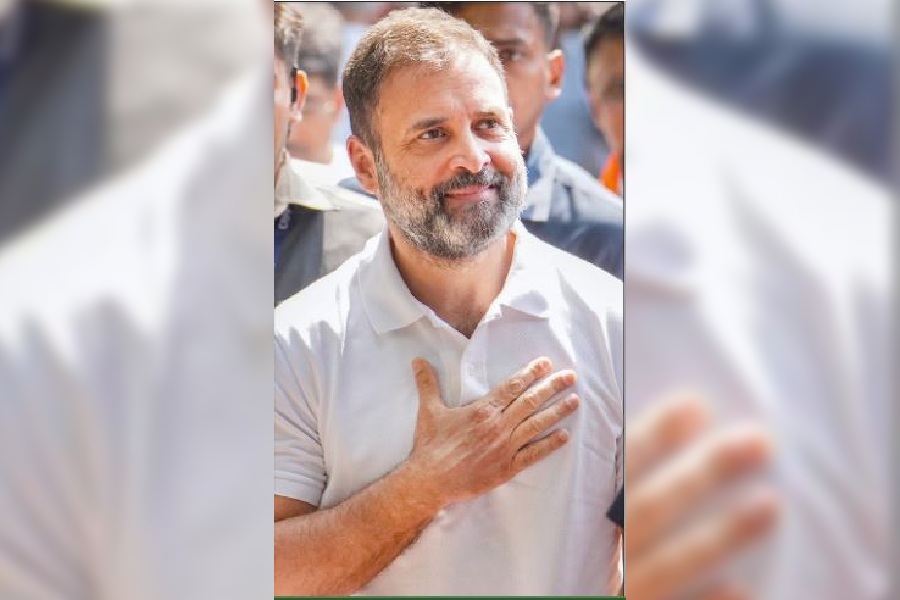Grace and humility are endangered species today. But these virtues have survived — as manifested through the thoughtful response of Congress president Mallikarjun Kharge after the resounding victory in Karnataka: “We have won. Now we have to work.”
There were no chest-thumping gestures, no triumphant rhetoric and no running down of the vanquished either. Kharge, who along with other Congress leaders fought valiantly to ward off the BJP’s colossal resources and propaganda, refused to even mildly criticise Prime Minister Narendra Modi who would pulverise his rival with his vicious verbal attack after every victory.
While Modi’s post-victory events create a dreadful spectre of doomsday for the Congress, both Kharge and Rahul Gandhi remained calm, giving brief and dignified responses. Kharge told the media in Bangalore: “It is a victory of the people. The people of Karnataka threw out a corrupt government. The Congress fought with unity, showing a collective leadership and the credit goes to both the workers and the leaders.”
He thanked Sonia Gandhi, Rahul and Priyanka Gandhi Vadra for supplementing the efforts of the local leaders. Asked whether this was the defeat of Modi, he said: “I don’t want to talk about these things today. I won’t criticise anybody.” On a question about the chief minister, he explained that the party follows a procedure.
Later, speaking at a local function in Bangalore, Kharge said this victory was important in the context of national politics but avoided attacking the Prime Minister.
In Delhi, Rahul, too, had a brief interaction with the media. He said: “I thank the people of Karnataka, our leaders and party workers. The Congress chose to stand with the poor; fought the election of the concerns of the poor. We are happy we didn’t rely on divisive, undesirable issues. The people of Karnataka appreciated our stand. The market of hate has closed down and shops of love have opened.”
Without giving sermons on the implications of this victory or the possible revival of the Congress, Rahul added that “we had given five guarantees and we will implement them at the first meeting of the cabinet in Karnataka”. He left without taking questions.
It is an extraordinary gesture from both Kharge and Rahul to talk about the promises made to the people without any questioning just after the victory. While political parties make lofty promises and take their own time, years in most cases, to fulfil or forget them, offering assurances of implementation before the formation of the government harbingers a new era of sincerity and accountability in politics.
Modi, who promised two crore jobs and many other things, stopped talking about them after becoming the Prime Minister in 2014. The most enticing suggestion of delivering Rs 15 lakh in every bank account was dismissed as “jumla” by the then BJP president Amit Shah. Modi, who used to viciously attack Manmohan Singh for the price of the cooking gas cylinder — Rs 410, ended up selling them for Rs 1,150. Petrol and diesel, hovering around Rs 60, crossed Rs 90 and Modi never spoke about it.
His post-victory mega events usually declared the BJP’s invincibility and the Opposition’s worthlessness. Addressing thousands of party workers at the BJP headquarters, he would often predict doom for his rivals. Even victories in small states would be hyped up as political developments fraught with enormous consequences. The Congress obviously learnt nothing from him and chose to stay calm on the day of this massive victory which could be a turning point in the history of modern India.
A point to illustrate Modi’s mood after defeating the Congress: he gave a 41-minute speech after the victory in Gujarat in December 2022. He said: “The support to the BJP means the next 25 years will be dedicated to politics of development. This is a reflection of India’s new aspirations, this is a manifestation of youth thinking, this entails empowerment of the poor, Dalit, backwards, oppressed, tribals. People supported BJP because they want all the facilities to reach them at the earliest.”
Modi described the mandate in Gujarat as a vote against dynasty and corruption. Dwelling on the “India-First” politics of the BJP, he said: “India’s future will become bright not by widening the faultlines but by reducing them. There can be several reasons for instigating fights among different groups of people on the basis of language, lifestyle, dress, food, class, caste… but one reason is enough to unite and that’s our country.”
He said: “The coming years are very important and we all have to work together in the spirit of sabka saath. Let’s all join hands for a developed India.”
Ironically, Modi’s own conduct defied the spirit of this speech as he tried to widen the faultlines by mixing religion and politics, and refused to answer questions on corruption and lack of development.











